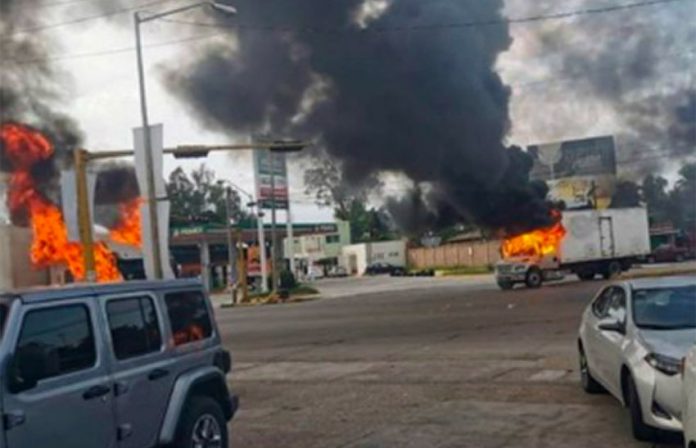Amid a wave of national and international criticism for his handling of the Culiacán meltdown last week, Mexican President Andrés Manuel López Obrador faces the toughest public security test of his presidency.
But his approach over the first 11 months of his presidency leaves him little room to maneuver, and there is little evidence that his analysis of the crisis bears much resemblance to reality.
López Obrador, who is popularly known as AMLO, has largely built his political identity on his opposition to the militarized security policy, which is associated above all with the administration of Felipe Calderón. During his 2018 campaign, AMLO’s most famous promise was to attack organized crime with “hugs, not bullets.”
Lest anyone confuse that slogan with a simple bit of irony, upon ascending the presidency AMLO made noises about negotiating with criminal groups and repeatedly intimated that he would ratchet down the pressure on drug traffickers.
In short, the message from Mexico’s president was that they would be given a greater degree of freedom, but he expected them to respond by reducing their acts of violence.
Unfortunately for AMLO, the gangs did not react as he hoped. Violence, which had been trending upward during the latter years of the administration of former President Enrique Peña Nieto, has continued to tick upwards; the first six months of 2019 were the most violent half-year in the nation’s recent history.
The explosion of violence was concentrated in specific areas that seemed to undercut AMLO’s arguments about his policy’s efficacy. Some of his first steps upon taking office were to cut down on fuel theft, a longstanding practice that criminal groups have begun pursuing on a near-industrial scale.
Instead of tamping down on the bloodshed, these policies helped turn once-tranquil Guanajuato, ground zero for fuel theft, into the most violent state in the nation. In both Guanajuato and Tijuana, another area where murders have skyrocketed, recent narcomantas – banners hung by drug cartels looking to communicate with the population, their rivals, or the state – have threatened AMLO directly.
InSight Crime analysis
Beyond the rhetoric, there has been a lack of logic underlying many of the actual policy shifts that AMLO has pursued. He announced the creation of a new federal police force, the National Guard, and he secured passage of a constitutional amendment formalizing the deployment of the military in domestic security.
Neither of these stratagems has paid off; the National Guard has thrown the federal police apparatus into disarray, as officers are reassigned and agencies redeployed, and the constitutional change was viewed as a betrayal of AMLO’s deepest principles.
Moreover, even the rhetoric emanating from the head of Mexico’s government has lacked consistency. During the summer, for instance, he adopted a more aggressive posture in a series of public speeches, chastising criminal groups for their acts of violence and repudiating any idea of negotiating with them.
The disconnect between AMLO’s rhetoric and his policies has created a persistent sense of incoherence, which culminated in last week’s events in Culiacán. The chaos reflected not only a confused, overmatched government, but also a criminal group that may well have been under the impression that its leaders no longer faced any threat from government pressure.
A scenario in which both sides are not abiding by the same informal rules of the road lends itself to miscalculations, which can have deadly consequences.
The recent developments have left AMLO’s administration and its supporters without much of a rhetorical leg to stand on. The president’s defenses of his decision to release Ovidio Guzmán have been vague and unconvincing, and appeared entirely untethered from any broader strategic decision.
His surrogates’ efforts at justification — including arguments that this represents the demise of the narco-state that prevailed under Calderón, and suggestions that the United States was behind the incident — have bordered on the fantastical. AMLO has dismissed the complaints as byproducts of political opposition, but journalists and analysts from across the ideological spectrum have denounced his performance.
The most basic problem facing AMLO is that his longstanding rhetoric has now backed him into a corner. From the very beginning of his campaign, AMLO promised that a security policy built around military de-escalation and attacking the social drivers of organized crime would, in short order, end the bloodshed of the past decade. He ridiculed his predecessors and his opponents, leaving his audiences with the impression that only an idiot or a crook could fail to tame Mexico’s security challenges.
But now it is AMLO who is perched upon the hot seat, and the root causes of Mexican insecurity are no more tractable than before.
And with a strategy built on a series of half-measures and fantasies, the flaws in his approach have grown unmistakable.
Reprinted from InSight Crime. Patrick Corcoran is a contributing writer for InSight Crime, a foundation dedicated to the study of organized crime in Latin America and the Caribbean.
